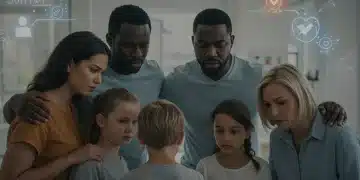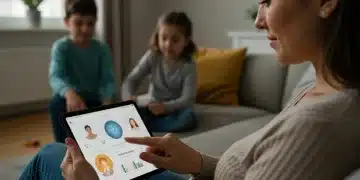Family Therapy in 2025: 3 Emerging Approaches Gaining Traction

Recent developments indicate a transformative period for mental health practices, with The Latest in Family Therapy: 3 Approaches Gaining Traction in 2025 (RECENT UPDATES, INSIDER KNOWLEDGE) offering renewed hope for families navigating complex challenges. These innovative methodologies are rapidly evolving, providing therapists and families with more effective tools to foster stronger, healthier relationships.
The Rise of Emotionally Focused Family Therapy (EFFT)
Emotionally Focused Family Therapy (EFFT) is emerging as a cornerstone in family interventions, building on the success of Emotionally Focused Therapy (EFT) for couples. This approach, gaining significant traction in 2025, centers on understanding and reshaping the emotional bonds within a family unit. Its primary goal is to help family members identify and communicate their underlying emotional needs, moving beyond surface-level conflicts.
EFFT operates on the premise that emotional security is fundamental to healthy family functioning. When family members feel emotionally safe and connected, they are better equipped to handle stress, resolve disputes, and support one another. The therapy guides families through a process of de-escalation, restructuring interactional patterns, and consolidating new, more secure ways of relating.
Key Principles of EFFT
EFFT emphasizes several core principles that differentiate it from other modalities. These principles are crucial for therapists implementing the approach and for families seeking to understand its benefits:
- Attachment Theory Foundation: EFFT views family distress through the lens of attachment needs, understanding that unmet emotional needs can lead to negative interaction cycles.
- Emotional Experience Focus: Therapy delves deep into the emotional experiences of each family member, helping them articulate feelings that may otherwise remain unspoken.
- Cycle Identification: A central component is identifying the negative interaction cycles that perpetuate family problems, often driven by underlying fears and unmet needs.
- Corrective Emotional Experiences: Therapists facilitate new, positive emotional experiences within sessions, allowing families to practice more secure and responsive ways of interacting.
The efficacy of EFFT lies in its ability to create profound emotional shifts, leading to lasting changes in family dynamics. Practitioners are reporting increased emotional literacy and stronger relational bonds among families adopting this therapeutic model, signaling a significant update in the field.
Integrative Family Systems (IFS) Therapy: A Holistic View
Integrative Family Systems (IFS) Therapy is another approach making substantial inroads in 2025, offering a holistic framework for understanding the individual within the family system. Unlike traditional family therapy that might focus solely on observable interactions, IFS posits that each person has multiple ‘parts’—subpersonalities with unique feelings, beliefs, and roles. This model extends to the family unit, viewing it as a system where each member’s internal parts interact with the parts of others.
The core of IFS work involves helping individuals access their ‘Self’—a core of compassion, curiosity, calm, and courage—to heal their wounded parts and harmoniously integrate their internal system. When applied to families, this means understanding how each member’s internal world influences the family’s overall dynamics and how the family system, in turn, impacts individual parts.
Understanding Family Parts and Roles
In IFS, family members often adopt specific roles or ‘parts’ in response to family stressors or historical trauma. These parts, while often well-intentioned, can create dysfunctional patterns if not understood and integrated. Therapists guide families to recognize these parts and their functions:
- Managers: Parts that try to keep us in control and protect us from pain, often through perfectionism, caretaking, or criticism.
- Firefighters: Parts that act impulsively to extinguish emotional pain, frequently through addictive behaviors, rage, or self-harm.
- Exiles: Wounded, often childlike parts that carry pain and trauma, often suppressed by managers and firefighters.
By fostering an understanding of these internal systems, IFS enables families to communicate more effectively, reduce blame, and cultivate empathy. This insider knowledge is proving invaluable for therapists seeking deeper, more sustainable healing for their clients. The approach is particularly effective in addressing intergenerational trauma and complex family dynamics, offering a nuanced path forward.
Narrative Exposure Therapy (NET) for Family Trauma
While broadly known for individual trauma, Narrative Exposure Therapy (NET) is increasingly adapted for family contexts, particularly where collective or shared traumatic experiences have impacted the entire unit. This innovative application of NET in family therapy is gaining significant traction in 2025, providing a structured yet compassionate way for families to process and integrate traumatic events into their shared life story.
NET’s core methodology involves constructing a chronological narrative of a person’s life, with a specific focus on traumatic experiences. When applied to families, this involves co-creating a shared narrative that acknowledges each member’s experience of the trauma, validating their feelings, and piecing together a coherent and cohesive family history. The goal is not to re-traumatize, but to help families move from a fragmented, chaotic memory of trauma to a more integrated and empowering life story.
Implementing NET in Family Settings
Adapting NET for families requires careful consideration of each member’s capacity and readiness to engage with traumatic memories. Therapists employing this approach utilize specific techniques to ensure a safe and supportive environment:
- Shared Timeline Construction: Families collaboratively build a timeline of their lives, marking significant positive and negative events, including the traumatic incident(s).
- Individual and Collective Storytelling: Each family member shares their personal account of the trauma, which is then woven into a larger, collective family narrative.
- Validation and Witnessing: The therapist facilitates a process where family members can witness and validate each other’s experiences, fostering empathy and mutual understanding.
- Integration and Future Orientation: The fragmented memories are integrated into a coherent life story, allowing the family to look towards the future with resilience and hope.
This evolving application of NET is particularly relevant for families who have experienced disasters, conflict, or other collective adversities, providing a framework for collective healing and meaning-making. Recent updates highlight its utility in diverse cultural contexts, making it a globally relevant approach.
The Role of Technology and Telehealth in Family Therapy 2025
The landscape of family therapy in 2025 is undeniably shaped by advancements in technology, particularly the widespread adoption and refinement of telehealth services. The ability to connect with families across geographical distances has revolutionized access to care, making specialized approaches like EFFT, IFS, and NET more accessible than ever before. This technological integration is not merely a convenience; it’s a fundamental shift in how therapy is delivered and experienced.
Telehealth platforms now offer secure, high-quality video conferencing that facilitates effective therapeutic interactions. This has proven particularly beneficial for families with busy schedules, those living in remote areas, or individuals facing mobility challenges. The comfort of engaging in therapy from one’s own home can also reduce initial resistance and create a more relaxed environment for open communication.

Moreover, technological tools are enhancing therapeutic processes. Digital worksheets, interactive exercises, and shared online resources are being integrated into sessions, allowing for a more dynamic and engaging therapeutic experience. This blending of traditional therapeutic principles with modern digital tools represents a significant update in the field, expanding the possibilities for effective family intervention.
The ongoing development of virtual reality (VR) and augmented reality (AR) applications also holds promise for future family therapy. While still in nascent stages, these technologies could offer immersive environments for role-playing, emotional regulation practice, and exposure therapy, further broadening the scope of what is achievable in a therapeutic setting. This ongoing evolution underscores the dynamic nature of family therapy’s future.
Addressing Diverse Family Structures and Needs
As society continues to evolve, so too do the definitions and structures of families. The latest in family therapy approaches for 2025 are increasingly attuned to the diverse configurations and unique needs of modern families. This includes single-parent households, blended families, LGBTQ+ families, and multicultural families, each presenting distinct dynamics and challenges. Therapists are recognizing the importance of culturally competent and inclusive practices to effectively serve these varied populations.
The three approaches gaining traction—EFFT, IFS, and NET—are inherently adaptable, making them suitable for a wide array of family structures. EFFT’s focus on attachment and emotional bonds is universal, transcending traditional family definitions. IFS’s internal systems model allows for an individualized understanding of each family member, regardless of their role or relationship within the family unit. Similarly, NET can be tailored to address shared trauma within any group that defines itself as a family.
Culturally Competent Practices
Therapists are undergoing specialized training to ensure their practices are culturally competent and sensitive. This involves:
- Understanding Cultural Norms: Recognizing how cultural beliefs and values influence family dynamics, communication styles, and help-seeking behaviors.
- Addressing Systemic Inequities: Acknowledging the impact of societal factors, discrimination, and historical trauma on diverse families.
- Language Accessibility: Providing therapy in the family’s preferred language or utilizing qualified interpreters to ensure effective communication.
- Tailoring Interventions: Adapting therapeutic techniques to align with the specific cultural context and values of the family.
This commitment to inclusivity ensures that family therapy remains relevant and effective for all families, reflecting a critical development in the field. The insider knowledge gained from working with diverse populations is continuously shaping and refining these therapeutic models, making them more robust and universally applicable.
Training and Certification for New Family Therapy Approaches
The growing prominence of Emotionally Focused Family Therapy (EFFT), Integrative Family Systems (IFS) Therapy, and the family application of Narrative Exposure Therapy (NET) in 2025 has led to a significant increase in demand for specialized training and certification programs. Mental health professionals are actively seeking to acquire the skills and knowledge necessary to implement these cutting-edge approaches, ensuring high-quality care for families.
Organizations dedicated to each modality are expanding their training offerings, which typically include foundational workshops, advanced supervision, and rigorous certification processes. These programs are designed to provide therapists with both theoretical understanding and practical application skills, fostering competence and ethical practice. The availability of both in-person and online training formats further enhances accessibility for practitioners globally.
Components of Specialized Training
Training programs for these advanced family therapy approaches often include a blend of educational and experiential components:
- Didactic Learning: In-depth lectures and readings on the theoretical underpinnings, models, and techniques of the specific therapy.
- Experiential Practice: Role-playing, simulations, and group exercises to practice therapeutic interventions in a supervised setting.
- Supervised Casework: Clinical supervision where trainees present their ongoing cases and receive feedback and guidance from experienced practitioners.
- Ethical Considerations: Training on the ethical implications and best practices associated with each therapeutic model.
Certification, once achieved, signifies a therapist’s expertise and commitment to these specialized modalities. This provides a crucial benchmark for families seeking qualified practitioners and for the mental health field as a whole. The continuous professional development in these areas is a testament to their increasing recognition and impact.
The demand for therapists proficient in these methods underscores a broader movement within mental health towards more targeted, evidence-based interventions for family systems. As these approaches gain further traction, ongoing research and refinement will ensure their continued evolution and effectiveness.
| Approach | Brief Description |
|---|---|
| Emotionally Focused Family Therapy (EFFT) | Focuses on emotional bonds and attachment needs within the family to foster secure connections. |
| Integrative Family Systems (IFS) Therapy | Views individuals and families as systems of interacting ‘parts’ and aims for internal and relational harmony. |
| Narrative Exposure Therapy (NET) for Families | Helps families collectively process and integrate shared traumatic experiences into a cohesive life narrative. |
| Technological Integration | Leverages telehealth and digital tools to enhance accessibility and effectiveness of therapy delivery. |
Frequently Asked Questions About Family Therapy in 2025
EFFT is a therapeutic approach gaining traction in 2025 that focuses on understanding and transforming emotional bonds within families. It helps family members identify underlying emotional needs, de-escalate conflicts, and build more secure attachment patterns to improve overall family functioning and communication.
IFS therapy views each family member as having various ‘parts’ or subpersonalities. It helps individuals access their ‘Self’ to heal wounded parts and integrate their internal system. Applied to families, it enhances understanding of how individual internal worlds influence family dynamics, fostering empathy and reducing blame.
Yes, NET is increasingly adapted for family contexts, especially for shared traumatic experiences. It involves families collaboratively constructing a chronological narrative of their shared life, including traumatic events, to integrate fragmented memories into a coherent and empowering collective story, promoting healing and resilience.
Technology, particularly telehealth, is crucial in 2025, expanding access to family therapy for remote or busy families. Secure video conferencing facilitates effective interactions, while digital tools like worksheets and online resources enhance engagement. Future developments in VR/AR could further broaden therapeutic possibilities, making therapy more accessible and dynamic.
Yes, EFFT, IFS, and NET are highly adaptable and increasingly applied with cultural competence to diverse family structures, including single-parent, blended, LGBTQ+, and multicultural families. Therapists receive specialized training to ensure interventions are culturally sensitive and inclusive, addressing unique dynamics and systemic inequities for all families.
Looking Ahead
The current trajectory of family therapy in 2025 indicates a continued pivot towards more integrated, emotionally attuned, and technologically supported interventions. As these three approaches—EFFT, IFS, and family-adapted NET—solidify their presence, the field will likely see further research validating their efficacy across diverse populations. Policymakers and insurance providers will also need to adapt to these evolving models, ensuring broader access and coverage for families in need. The focus remains on fostering resilience and strengthening family bonds in an ever-changing world, with ongoing developments expected to further refine these promising therapeutic pathways.





